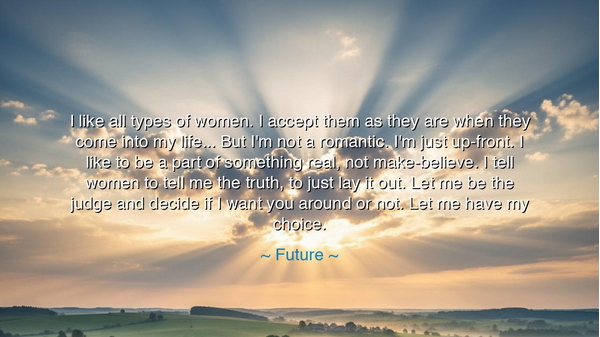
I like all types of women. I accept them as they are when they
I like all types of women. I accept them as they are when they come into my life... But I'm not a romantic. I'm just up-front. I like to be a part of something real, not make-believe. I tell women to tell me the truth, to just lay it out. Let me be the judge and decide if I want you around or not. Let me have my choice.






"I like all types of women. I accept them as they are when they come into my life... But I'm not a romantic. I'm just up-front. I like to be a part of something real, not make-believe. I tell women to tell me the truth, to just lay it out. Let me be the judge and decide if I want you around or not. Let me have my choice." These words, spoken by Future, echo a stark reality about the nature of relationships and the pursuit of authenticity in an often idealized world. The speaker lays bare a philosophy of honesty, one that values transparency and truth over illusion. In a world where romantic ideals often cloud judgment and expectations, Future rejects the fantasies of love, seeking instead something real—unadulterated by the illusions of perfection.
In the ancient world, there were also those who believed that love, like all things, should be founded on truth. The Stoic philosophers, in their teachings, stressed the importance of facing life as it is, not as we wish it to be. Epictetus, one of the greatest Stoic thinkers, spoke of accepting the world for what it truly was, and in doing so, attaining inner peace. Similarly, Future's stance aligns with a form of pragmatism—where one seeks the truth of a person, free from the veil of romantic illusions. To embrace someone for who they are, not for who we imagine them to be, is a practice of clarity and acceptance that dates back to the ancients.
What Future expresses is not a rejection of love, but a rejection of the falsehoods that often surround it. In times long past, Alexander the Great famously sought to unite the East and West not through romantic notions, but through genuine diplomacy and honest agreements. His actions were driven by a desire to build something real, based on trust and clarity—not based on myths or exaggerations. In much the same way, Future’s words are not an invitation to forsake relationships, but a call to unveil truth in the interactions between men and women. The essence of his philosophy is about accepting others as they are, without the layers of pretense and unrealistic expectations.
In this light, Future’s assertion to "just lay it out" aligns with a deep human need for clarity and honesty in all affairs of the heart. Consider Socrates, whose method of dialogue was built upon the search for truth. Through persistent questioning, he sought to strip away the layers of illusion that clouded men’s understanding, revealing the core of knowledge. In relationships, just as in philosophy, Socrates believed that clarity was the foundation for genuine connection. To engage in a relationship that is based on falsehoods is to lay the groundwork for misunderstanding and discontent.
What can we learn from Future's words? It is the courage to face the truth of a situation, even when it may not be convenient or comforting. In a world where it is easy to succumb to the idea of ideal love, to seek out the fairytale that has been handed down through generations, there is great strength in being up-front and honest. It is about freeing oneself from the constraints of expectation and seeking instead a partnership founded on mutual respect, clarity, and shared values. Like the warrior who steps onto the battlefield, armed not with illusions of invincibility but with the knowledge of their own limitations, we must approach relationships with the same fortitude and authenticity.
Future's desire to choose based on truth is a reminder that power lies in choice. Just as Plato's Allegory of the Cave shows that the prisoner, once freed from the shadows, can now see the truth of the world around him, so too must we step out of the illusions of romanticism to see each other clearly. In relationships, we must be able to make choices based on what is real, not what is imagined or hoped for. This clarity is not just about romantic partners, but about the very nature of the human connection—seeking people who align with our truths, not with the versions of ourselves we project to the world.
The lesson here is simple yet profound: seek the real, not the ideal. In every relationship, be it romantic, familial, or platonic, we must learn to embrace others as they are, and to make choices based on the truths we share. Only then can we build connections that are genuine and lasting. Like the philosophers and warriors of old, let us strip away the illusions that cloud our understanding, and approach each person with open eyes, clear hearts, and a deep respect for the truth of who they are. Let us embrace authenticity, for it is only in the light of truth that real, meaningful relationships can flourish.






AAdministratorAdministrator
Welcome, honored guests. Please leave a comment, we will respond soon